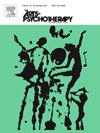Psychodrama’s effects on PTSD, depression, anxiety, traumatic grief, prolonged grief disorder, and spontaneity: A mixed methods study in inpatient addiction treatment
IF 1.5
3区 心理学
Q3 PSYCHOLOGY, CLINICAL
引用次数: 0
Abstract
This study (n = 148) examines psychodrama as an effective group therapy in an inpatient substance use setting as a treatment for post-traumatic stress disorder (PTSD), depression, anxiety, and traumatic grief. Overall quantitative outcomes indicate an average reduction in PTSD by 52.71 %, depression by 61.76 %, anxiety by 53.72 %, traumatic grief by 31.39 %, and prolonged grief disorder (PGD) by 32.36 %. Results also show an increase in spontaneity by 31.08 % and high patient satisfaction scores related to the experience of participation in the trauma-focused psychodrama groups. Qualitative findings from patient surveys support the quantitative outcomes and provide additional insight into participants’ experiences of the sessions. The outcomes of this mixed-methods study further contribute to the research base of psychodrama as an effective treatment for PTSD, depression, anxiety, and traumatic grief, while also highlighting the essential role of spontaneity – the curative agent in psychodrama psychotherapy. While there are multiple limitations in this study, the overall results point to psychodrama as a viable group therapy modality in inpatient addiction treatment to address co-occurring disorders.
心理剧对创伤后应激障碍、抑郁、焦虑、创伤性悲伤、长期悲伤障碍和自发性的影响:住院成瘾治疗的混合方法研究
本研究(n = 148)检验心理剧作为一种有效的团体治疗在住院患者物质使用设置作为治疗创伤后应激障碍(PTSD),抑郁,焦虑和创伤性悲伤。总体定量结果显示,PTSD平均减少52.71 %,抑郁减少61.76 %,焦虑减少53.72 %,创伤性悲伤减少31.39 %,延长性悲伤障碍(PGD)减少32.36 %。结果还显示,自发性增加了31.08% %,患者满意度得分较高,与参与创伤性心理剧小组的经验有关。来自患者调查的定性结果支持定量结果,并为参与者的会议体验提供了额外的见解。本混合方法研究的结果进一步为心理剧作为创伤后应激障碍、抑郁、焦虑和创伤性悲伤的有效治疗提供了研究基础,同时也突出了自发性作为心理剧心理治疗的治疗剂的重要作用。虽然本研究存在诸多局限性,但总体结果表明,心理剧作为一种可行的团体治疗方式,可用于治疗住院成瘾患者并发疾病。
本文章由计算机程序翻译,如有差异,请以英文原文为准。
求助全文
约1分钟内获得全文
求助全文
来源期刊

Arts in Psychotherapy
Multiple-
CiteScore
3.20
自引率
11.10%
发文量
66
期刊介绍:
The Arts in Psychotherapy is a dynamic, contemporary journal publishing evidence-based research, expert opinion, theoretical positions, and case material on a wide range of topics intersecting the fields of mental health and creative arts therapies. It is an international peer-reviewed journal publishing 5 issues annually. Papers are welcomed from researchers and practitioners in the fields of art, dance/movement, drama, music, and poetry psychotherapy, as well as expressive and creative arts therapy, neuroscience, psychiatry, education, allied health, and psychology that aim to engage high level theoretical concepts with the rigor of professional practice. The journal welcomes contributions that present new and emergent knowledge about the role of the arts in healthcare, and engage a critical discourse relevant to an international readership that can inform the development of new services and the refinement of existing policies and practices. There is no restriction on research methods and review papers are welcome. From time to time the journal publishes special issues on topics warranting a distinctive focus relevant to the stated goals and scope of the publication.
 求助内容:
求助内容: 应助结果提醒方式:
应助结果提醒方式:


